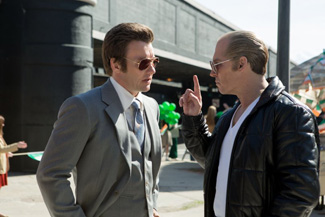|
|
Movie Review: Black MassBy Matthew HuntleySeptember 24, 2015
The major player on the FBI side is John Connolly (Joel Edgerton), who’s recently moved back to South Boston. Connolly grew up with Jimmy and Jimmy’s brother, William (Benedict Cumberbatch), who’s now a U.S. senator. Despite their current roles on opposite sides of the law, Connolly still considers Jimmy his mentor and protector, and because Connolly feels inclined to remain loyal to his friend, he offers him the opportunity to partner with the FBI and acts as their informant. In exchange, Connolly indirectly promises Jimmy a sort of immunity from his own transgressions, so long as the intelligence he provides them is usable and leads to the take down of the city’s bigger crime cheeses, particularly the head of the local Italian circuit, which reputedly has ties to the mafia. Reluctant at first and turned off by the idea of acting as a “rat,” Jimmy eventually justifies Connolly’s offer because it’ll give him a chance to grow his own ring while simultaneously eliminating his competition. Plus, he knows he’s got Connolly on a leash. As the years pass, Jimmy and Connolly’s arrangement frustrates Connolly’s boss (Kevin Bacon) and fellow agents when Jimmy’s information fails to bear any real consequence. Even after a major break, the FBI remains suspicious of their dealings and rightly suspect Connolly’s friendship with Bugler is overshadowing his better judgment and that Connolly himself may be getting his own criminal feet wet, something that’s most obvious to Connolly’s wife, Marianne (Julianne Nicholson), who tells him, “You’re dressing different. You’re walking different.” I’m sure Black Mass serves as but a mere representation of the actual Jimmy Bulger story, as much of it seems wrought in order to function as mainstream Hollywood entertainment. But still, as a crime drama, it intensifies as it goes along and aptly holds our attention. The actors embody their characters instead of simply imitating their real-life counterparts, and thanks to the makeup department, we believe they really age over the film’s 20-year period. True: we may have treaded this narrative road before, but director Scott Cooper lends it a good amount of tension and drama so that we respond to the events and people, and at the end of any film, be it one that’s unforgettable or not, that’s what matters.
|

|
|
|

|
Thursday, October 31, 2024
© 2024 Box Office Prophets, a division of One Of Us, Inc.


